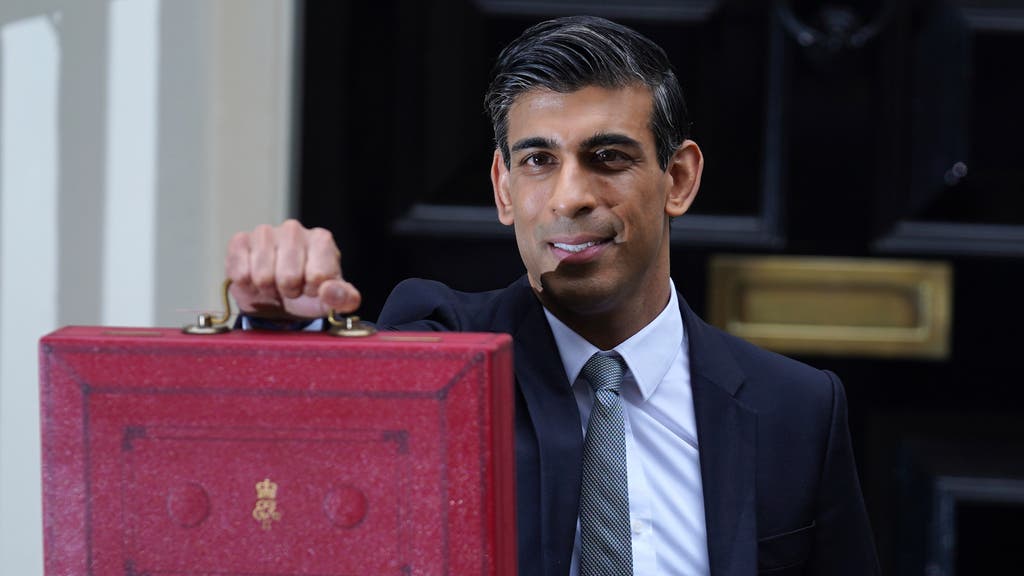Britain is getting poorer on Rishi Sunak’s watch despite his sunny optimism
Britons’ real disposable incomes are on course to fall over the course of the current parliament. That hasn’t happened since 1955, when the figures were first recorded. The problem for Labour, writes James Moore, is that the electorate doesn’t trust it to do any better


Rishi Sunak is slick, sharp, and as impressive a salesman as British politics has seen in quite some time. This is helping to shield his party from an uncomfortable reality: he’s presiding over the weakest income growth on record. That’s real disposable income growth, adjusted for inflation.
By the end of the current parliament, he might even have delivered a fall, something which hasn’t happened since 1955. That was when the records were first kept. So they don’t cover either the depression of the 1930s, or what went on during the second world war.
The latest projection from the Office for Budget Responsibility (OBR) is for real household disposable incomes (RHDI) to have grown by a measly 0.5 per cent in total between late 2019 and the middle of 2024, when the next election is due.
This, notes the Resolution Foundation, would make it the weakest parliament for income growth on record. The 0.1 per cent annual rise that the OBR is projecting is appreciably worse than what occurred during the Cameron-May parliament, which ran from May 2015 to June 2017 and delivered 0.3 per cent a year. The disappointing 0.9 per cent annual growth witnessed over the course of the Blair-Brown parliament from May 2005 to May 2010 looks positively balmy by comparison.
But wait: it gets worse. The foundation points to recent data from the Office for National Statistics, which shows that RHDI has lately been performing below the OBR’s expectations, falling by 1 per cent in the second quarter of 2021, for example. The OBR forecast growth of 1.5 per cent during that period.
Now, a better than expected performance in future could allow for a catch-up as the UK shakes off its pandemic-era economic funk. The government might have dropped most of its restrictions, but that era isn’t over. There remains a risk of them coming back, or at least some of them, and Covid still casts a shadow over a number of sectors. A significant number of consumers remain wary of attending events, for example. The supply-chain crisis it has played a role in delivering also continues to dog UK plc.
But let’s say income growth fails to pick up. If that’s the case, RHDI will end the parliament in negative territory. Under the current government, the British people will have been made poorer, which is a potential millstone hanging around Sunak’s neck. Future reports and commentary like this discussing incomes will inevitably say “Worst performance since the Sunak era” when things look dicey. That is a legacy no chancellor wants. All the salesmanship in the world won’t shake it.
Taking a longer-term look at income growth isn’t any more attractive when it comes to the Tories’ economic record. The figures the foundation puts forward ought to blow the party’s never fully deserved reputation for economic competence out of the water.
Over the past 15 years (2007 to 2022), Resolution says, RHDI has grown by just 9 per cent. That compares to a pre-financial-crisis normal of almost 50 per cent growth over a 15-year period. Had the pre-crisis trend continued post-2007, household disposable incomes today would be a third higher. That’s £7,000 per person in real money.
Now there are reasons for this, not all of which are under politicians’ control. The financial crisis was a global black swan that delivered a particularly devastating blow to the UK economy, which has an unusually high financial services component. It had barely shaken that off when Covid arrived. The pandemic denied the economy the extended period of growth it has traditionally enjoyed between crises.
But some of Britain’s problems clearly have been the result of political actions. Brexit, which continues to cast a long shadow, would be one of those. Austerity, which reduced Britain’s growth rate in the years after the financial crisis, would be another.
You could easily make a case that the ongoing decline in union membership, and the suppression of union rights, also contributed. Collective bargaining reduces the power imbalance between workers and employers. Wages, and thus disposable incomes, are higher where it exists, a fact noted by Bank of England economists in a recent paper I highlighted in this column.
Despite all this, Sunak’s sunny optimism is (so far) winning out. The polls suggest that his delivery is still dazzling the electorate.
Can this last? Economic satisfaction, or the lack of it, and people’s view of their future prospects, have traditionally played a major role in elections.
Ronald Reagan memorably asked: “Are you better off today than you were four years ago?” en route to victory over Jimmy Carter, because voters decided they weren’t. That was a year after Margaret Thatcher had said “Labour isn’t working.”
Maybe the culture wars beloved by Boris Johnson have trumped that. Or – and here’s the real trouble for a Labour Party that requires a historic swing to get within sniffing distance of power – maybe the electorate simply doesn’t trust the opposition to make things any better.
That’s an issue the party has to address, and quickly, because the clock is ticking.






Join our commenting forum
Join thought-provoking conversations, follow other Independent readers and see their replies
Comments